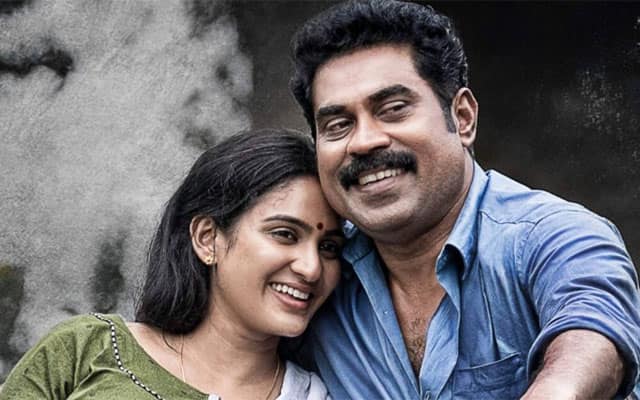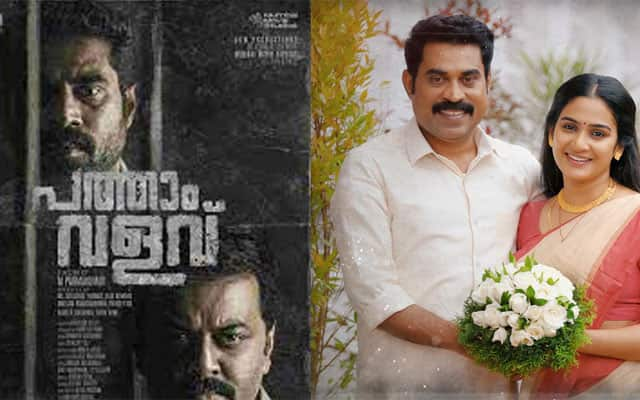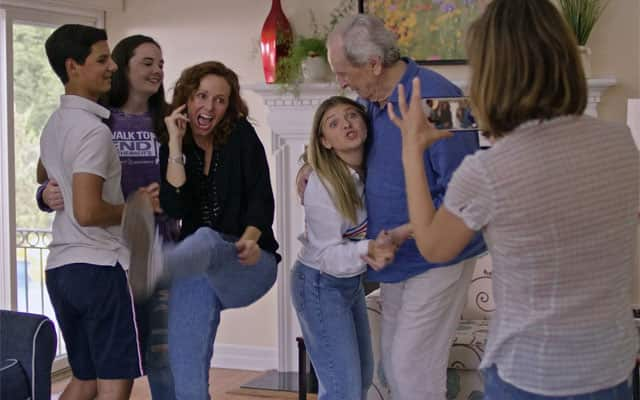The bonding between fathers and daughters is truly special. While a plethora of films of diverse themes and qualities projecting the mother-son relationship has been attempted, the father-daughter axis remains largely unexplored in our films.
In M Padmakumar’s underrated Malayalam film Pathaam Valavu, a father has no solution on hand when his 6-year old daughter is raped and murdered.
But I am going ahead of myself. Pathaam Valavu opens with a sullen cop Sethu (Indrajit Sukumaran) being assigned to bring back into custody a parole-skipping murder convict. After a lengthy chase filmed in the dense forests with the camera prowling in hot pursuit, the convict is caught.
[caption id=“attachment_11019731” align=“alignnone” width=“640”]  A still from the film[/caption]
On the way back, the cop gets chatting with the criminal. This is when the horrid truth about the murder comes out. This is where we the audience must take a stand and not allow the cop to dismiss the convict Solomon (Suraj Venjaramoodu)’s plea to let him go free for 24 hour so that he could finish his unfinished business.
It is a terribly inappropriate request. But one that the cop is compelled to actually consider. When the law fails the common citizen, should he be allowed to take the law into his own hands? The hard-hitting melodrama constructs an intense but calm case for vigilantism. At the end, justice is served. But the price for privatized justice is steep.
There are some narrative problems in Pathaam Valavu. The character of the cop played by Ajmal Ameer, who was to marry Solomon’s wife before she chose Solomon, is grossly problematic. But no scriptural aberration is so grave that we overlook the film’s intrinsically powerful plea for justice over guidelines.
Impact Shorts
More ShortsThe narration is constantly on the lookout for answers to questions with a dead-end. This film is not so much into solutions. But it is at liberty to draw its own islandic conclusions. Many critics have not liked Solomon’s self-designed justice. They feel it gives off wrong signals. I say, to hell with niceties. Pathaam Valavu shows us why justice is above the law. It is a hard-hitting statement made with a little less finesse than I expected. Some gimmicky plot manoeuvrings could have been avoided.
[caption id=“attachment_11019751” align=“alignnone” width=“640”]  A poster of the film[/caption]
A rather out-of-place suspense slab is nailed to the plot whereby we don’t know for sure who murdered the little girl. The child’s father seems more focused on what he wants than the plot. This could be attributed to the fact that the grieving father is played by the amazingly versatile Suraj Venjaramoodu. Is there anything that this actor cannot do? We saw him as the sexist husband in The Great Indian Kitchen. Now, he is almost unrecognizable as the grieving father.
The scenes after the child’s body is discovered are so heartbreaking, I wept with Solomon and his inconsolable wife(Aditi Ravi). Grief is not easy to express, especially in cinema where it is prone to become overstated and theatrical. But in Pathaam Valavu, grief becomes the fuel for action when justice is served cold. Although, some portions of the film are a wee gimmicky, Pathaam Valavu hits home the indelible affinity of grief to justice .
There is a sequence towards the end when the cop proudly shows his newly-born daughter’s picture to Solomon and quickly realizes his unintended insensitivity.
Solomon tries to be happy for the other father in the room. He tried to smile. But damn, the tears get in the way.
Writer-director Deirdre O’Connor’s moving family drama , has acquired an added dimension ever since its leading man the richly articulate Danny Aiello passed on into the ages soon after the completion of this work, making it an unexpected farewell piece on old-age whims and impending mortality.
Sure, there have been other more powerful films about harried daughters trying to cope with their impossible fathers, like our own Piku and the recent The Father where Anthony Hopkins was beyond brilliant as the dementia-ridden father who Olivia Colman finds impossible to cope with.
The world of Danny Aiello’s Joe McGuinness is far less complicated. His three middle-aged children Caroline (Adria Tennor), Fran (Frankie Ingrassia), and Rick (Sal Rendino) agree their father is a handful. But the problems they encounter as guardian-children are very much in the manageable zone.
[caption id=“attachment_11020011” align=“alignnone” width=“640”]  A still from One Moment[/caption]
When we first meet Joe, he waits for daughter Fran who is running sinfully late trying to negotiate the traffic to the university where she teaches while attending to endless reminder call from her cranky father.
The opening sets the film’s mood, showing us how difficult it is for the daughter to juggle between her immediate family and her father and her work place. But like I said, nothing unmanageable. It is equivocally apparent that Fran bears the burden of her father’s demands while her sister Caroline tries to sort out her complicated love life.
Here, I must pause to wonder why the theme of conservatism versus same-sex relations, needed to be brought in. The film works just as well without plot contrivances thanks mainly to Danny Aiello whose patriarchal arrogance would be intolerable if it were not so endearing. That this turned out to be Aiello’s last hurrah is just plain good providence.
Danny Aeillo is flawless in his fits of frenzy and bouts of self-pity. He wants his children to give him attention non-stop. He gets it in a bar where he sings a moving song on mortality. At home, there is a dinner where Joe’s grand daughter brings home the man whom she wants to marry immediately, and we soon know why.
Interestingly, Joe’s son remains in the shadows constantly. This is the daughters’ story. They cope as well as they could. Writer-director Deirdre O’Connor doesn’t romanticize the daughters’ struggle. But she does tell us, in not so many words, that a demanding parent is not a crisis. It is a challenge to prove oneself true to one’s heart.
One Moment ends with Joe flanked by his two daughters watching his wedding video that he never watched because…well, his wife wasn’t with him to watch it. I don’t know why. But the tears flowed at that point. Did I feel envy, regret or just unconditional joy at that point? Goodbye, Danny Aeillo. Hollywood was never fair to you, casting you in fits and starts not giving you until just before the end, that one role that puts you on a par with Anthony Hopkins, Robert de Niro and Christopher Plummer. Thankfully ,it happened before it was too late.
Every girl-child sees her father as a hero and her first love.When we first meet the Guerrasio family in Jonas Carpignano’s A Chiara, they are in a seriously celebratory mood. Hindi mainstream cinema has warned us that when there is too much happiness on display in a family, there is tragedy waiting ahead. Sure enough, after one of the Guerrasio daughters (there are so many of them , all talking fighting heckling screaming at the same time, I lost count) celebrates her eighteenth birthday, the party ends.
The father of the family vanishes after a drunken party and a midnight attack.
The focus is now on the 15-year Swamy (Swamy Rotolo) as she must unravel her father’s life, the hero she thought she knew. But was he really the ideal father he seemed to be? Swamy’s journey into darkness is delineated with a desperate diligence. Director Jonas Carpignano opens up one shuttered and bolted door after another in Swamy’s existence. She is not the least afraid to walk through those doors in search if the truth about her father’s dual identity.
There is no dearth of drama in this scrupulous portrait of a disintegrated family. The director uses a docu-drama tone that augments the aura of authenticity. Real family members of the young beautiful actress Swamy Rotolo playing the 15-year old protagonist, play her family in the film. The result is a film that is never short of authenticity.
And yet, for all its leaps at authenticity, there is some kind of a freeze in the narrative’s progression towards true excellence. The film LOOKS real, the drama is engaging albeit in fits and spurts. But the real tragedy of a happy family falling apart never hits us as hard as it should.
If you ask me, what stops the film from attaining greatness, I will have to search hard for clues in the storytelling. One failing that we encounter as the plot goes from familial bliss to national tragedy, is the absence of clarity in the supporting cast. The fringe characters are a blur of babble and backchat.
Whether intentional or not, Swamy Rotolo stands at the centre of the gravity-defying plot. And she is eminently credible. The narrative moves in unexpected ways. The cinematographer Tim Curtin preserves a sense of urgency and danger in the quivering visual aesthetic as if the entire proceeding was being recorded as evidence for a legal crisis that lay ahead.
The theme of a child hero-worshipping a parent who has a dark secret life is nothing new. What makes A Chiara unique is the journey that the daughter undertakes after she discovers her father’s secret life. A Chiara is not as revealing a journey as Italian director Jonas Carpignano, Mediterranea (2015) and A Ciambra (2017). But as a closure to a trilogy set in Calabria, it works just fine.
Amazon Prime Video has a big winner in Hannah Marks’ crazily conventional melodrama Don’t Make Me Go. It’s a four-handkerchief two-handler about a father Max (John Cho) and his typically tantrum-prone rebellious daughter Wally(Mia Isaac) who doesn’t like her father snooping into her life.
But hey, a father has got do what he has got to do. Cho (who we know as Harold to Kal Penn’s Kumar) and Mia Isaac, share some truly terrific togetherness (I won’t use the oft-abused word ‘chemistry’ because no one knows what that means). Indeed, they look so much like a real-life father and daughter that I had to google to see if they really are (for the record, they are not).
Director Hannah Marks, who also plays a small but striking role in the film, was first noticed for in her directorial debut After Everything, in 2018 for her deft understanding of human ties during times of crises. She likes to keep the proceedings light even when the going gets really rough for her characters.
Soon into their capricious kinship, the father Max discovers he has an inoperable tumour and only months to live. Now if I was given this script to read, I would hastily reject it. The concept is corny. What Hannah Marks does to it is impressively held-back low-key and sometimes marginally moving.
As Max and Wally hit the road to meet Wally’s mother whom she has never known, the film delves into driving issues: Wally is a lousy driver but she insists on driving . On the way, the bantering and the mutual bickering never stops. We wait for the elephant in the car to be addressed.
We wait for the big revelation when the father would tell the daughter that he is dying. When it comes , the moment is not only lame but it also fails to capture the gravity of the situation. The film wants to keep it frothy and cool all the way. In the process, some of the potentially moving situations are squandered in skittishness and worse, insensitivity.
A terminal illness in a family, specially a family of two, is no laughing matter. Don’t Make Me Go wants us to keep smiling all through its voyage into the heart of the matter. But it possesses neither the crackling script nor the underlining verve to pull off a fun film on death.
Also, the climax when Max finally reaches his daughter’s mother’s home, is not only a letdown but also highly unconvincing. I don’t want to give away the plot. But which mother in the world behaves the way this one does?
But the worst blow is the ending. It is so contrived that it feels like a betrayal. All through the journey in Don’t Make Me Go, John Cho and especially Mia Isaac are so convincing as father and daughter. Why did they have to be put in a script that doesn’t know the first thing about a decent closure?
The most honest line in the film is when Wally, in a voiceover tells us, “I know you won’t like the way it ends.” Right you are, Sweetheart.
Subhash K Jha is a Patna-based film critic who has been writing about Bollywood for long enough to know the industry inside out. He tweets at @SubhashK_Jha. Read all the Latest News , Trending News , Cricket News , Bollywood News , India News and Entertainment News here. Follow us on Facebook, Twitter and Instagram.


)

)
)
)
)
)
)
)
)



